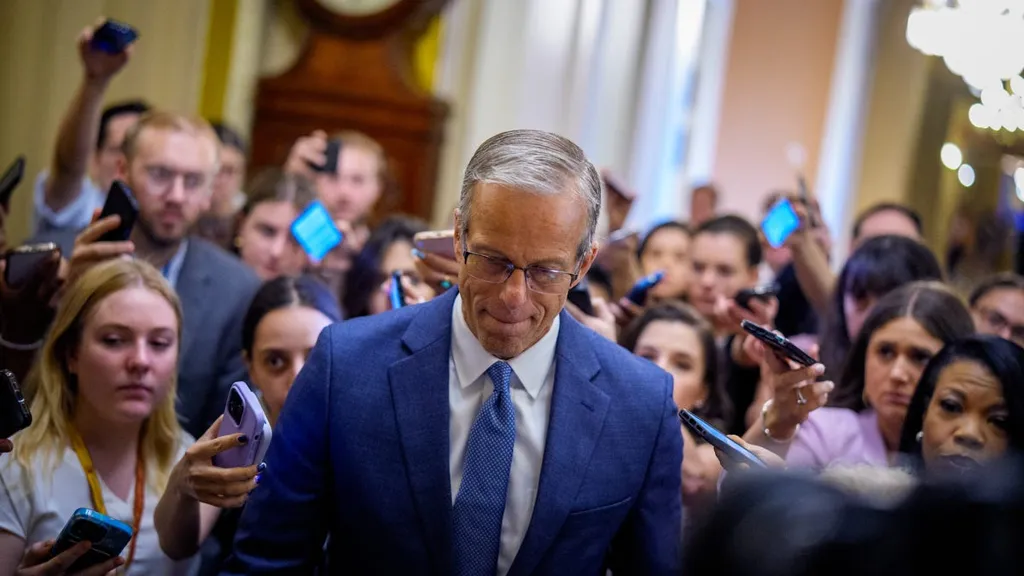President Donald Trump's amended bill was narrowly passed by the Senate, with Vice President JD Vance's vote breaking the 50-50 tie.
On Tuesday, July 1, the Senate passed its version of President Donald Trump's ironically named One Big Beautiful Bill Act. The bill is anything but beautiful.
After weeks of negotiating, the Senate finally got the votes to send its version back to the House of Representatives. Any hope of the Senate being the more responsible legislative body, which is generally the case, vanished as it became clear they would pass a spending monstrosity even worse than the version the House put together.
While it was necessary to extend the 2017 Trump tax cuts, the Senate has passed a completely irresponsible budget that endangers America's fiscal health.
The Trump tax cuts needed to be extended, but not like this
This entire piece of legislation is oriented around extending the 2017 Trump tax cuts, which is good policy. In fact, it's just about the only good part of the bill.
If not extended, the expiration of the 2017 Tax Cuts and Jobs Act would have been devastating to Americans. If allowed to expire, 62% of Americans would see a tax increase, according to the Tax Foundation. Extending the TCJA would result in a gross domestic product growth of 1.1% in the long run.
The issue is that the extension of these tax cuts will result in a revenue loss of $4.5 trillion for the federal government. The economic growth spurred by the act will cover just $710 billion of that shortfall, leaving nearly $3.8 trillion that needs to be paid for somehow.
The tax cuts themselves aren't the only significant source of spending in the bill. A sticking point for swing district Republicans has been the state and local tax (the SALT deduction), or the amount of state tax burden taxpayers can deduct from their federal income tax. Certain House Republicans have demanded that the annual limit of $10,000 be raised to $40,000, and the Senate has begrudgingly given them their increase for the next five years.
I've written elsewhere about why the SALT deduction is bad policy, but combined with other changes to the alternative minimum tax would result in a $325 billion revenue loss on net. The Senate's version is even more generous on these policies than the House's version was.
Additionally, the big ugly mess includes no tax on tips, social security and overtime pay. Neither Trump nor Republicans more generally have made a case for why these types of income are deserving of exempt status, and they amount to nothing more than a populist bribe of voters. These policies add hundreds of billions more to the revenue decreases from the tax cut extension.
Other defense and immigration enforcement provisions bring the grand cost of the legislation up to $4 trillion once the long-term economic growth is accounted for. Work requirements for Medicaid benefits and food stamps are the chief sources of new funding to offset these costs, as well as the elimination of certain clean energy tax credits.
The House should hold the line against Senate's fiscally irresponsible bill
As written, the Senate version of the bill adds even more to the budget deficit than the version the House put together. The House version was a fiscally irresponsible mess, which was estimated to add about $1.7 trillion to the deficit over the next decade, even after considering the economic growth that the bill is projected to create. The Senate version is estimated to add $2.9 trillion under the same metrics.
Some House Republicans have already expressed frustrations with the Senate version of the bill, which House Speaker Mike Johnson wants to pass before Friday, Independence Day. The budget hawks in the House must hold the line against the careless spending the Senate has engaged in. The House bill that passed in the first go-around was a mess, and the Senate made it even worse.
The Senate version also exaggerates its benefits and underestimates its costs by making many of its programs temporary. This allows them to gloss over this fact when discussing the benefits while claiming a lower cost.
All of these games are played in order to avoid tough political conversations about slashing entitlements, the chief cause of our escalating budget crisis.
I have little faith in the House's ability to stop this mess of a bill. Our legislators (with one notable exception) are so terrified of the prospect of a Trump primary challenge that they will vote for just about anything to avoid being the one to hold up the president's desired budget.
America's takeaway from this should be to laugh hysterically the next time Republicans claim to be the party of responsible spending. For all the talk of slashing government spending, the GOP has put together one of the most counterproductive efforts in modern history.
